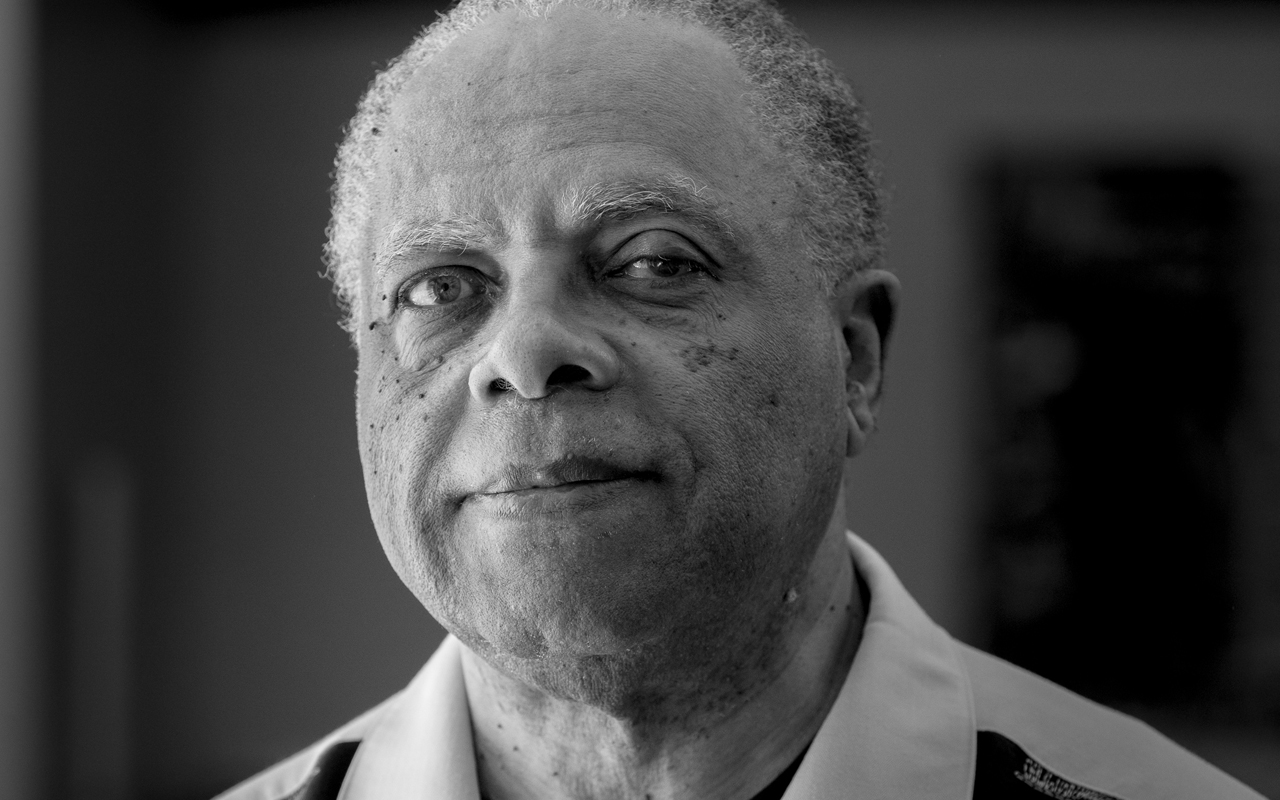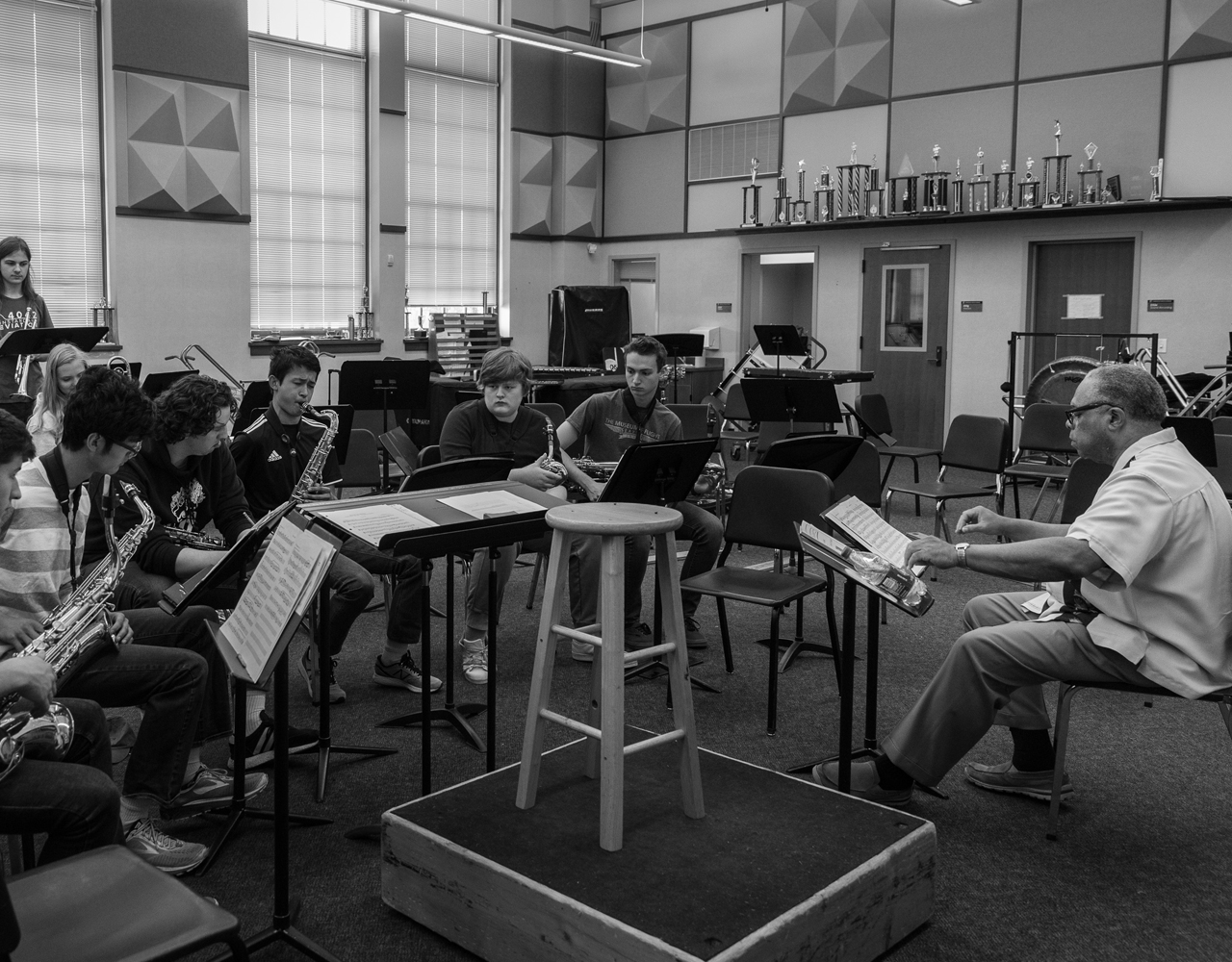
Clarence Acox photo by Daniel Sheehan.
By Paul de Barros
“We had a good year,” says Clarence Acox, director of the Garfield High School Jazz Band, sitting in the piano lab at the school where he has built a jazz program admired across the nation.
Sure, Garfield’s archrival, Roosevelt, took first place at the Essentially Ellington competition in May, finally tying Garfield’s record of four wins at the Cadillac of student jazz competitions.
But after two years of not making the finals, Garfield was back in the running, which was a big deal.
“We were pretty crushed when we didn’t make it those two years,” says graduating senior Aidan Siemann, who will be taking his tenor saxophone to the San Francisco Conservatory in the fall. “But those two misses pushed us to work a lot harder this year.”
All that hard work also probably explains why the Bulldogs won in their divisions at both the Lionel Hampton and Reno competitions. Not a bad year at all. If you’re counting, it marks Acox’s 48th at Garfield. Recruited in 1971 out of Southern University, in Baton Rouge, Louisiana, as part of an effort to diversify Seattle public school faculties, the 71-year-old New Orleanian was hired to reinvigorate school spirit with Garfield’s marching band, but jazz followed, in 1979. Since then, Garfield has been a consistent winner at regional competitions and has made the finals of Essentially Ellington 15 out of 21 years.

So what’s his secret?
“I really can’t explain it,” says Michael Brockman, co-founder with Acox of the Seattle Repertory Jazz Orchestra (SRJO), which celebrates its 25th season this fall. “It’s a mystery. But whether it’s students or professionals, he conveys to the musicians this sense of how the music feels, and what it should sound like, almost by osmosis.”
For Siemann, Acox’s magic also stems from his demeanor. An imposing man with a broad, round face and a deep caramel voice that have led people on the street to mistake him for
James Earl Jones, Acox projects both warmth and gravity when he looks at you straight in the eye. “The way he walks through the door and expects everything of you,” says Siemann. “It pushes you not to let him down.”
Garfield High School is not the only arena where Acox’s influence can be felt in Seattle music. He played for 27 years with late Floyd Standifer at the New Orleans Creole Restaurant with the Legacy Band and has released two excellent CDs of his own music, Joanna’s Dance and Indigenous Groove.
And then there is the SRJO, which recently raised $90,000 at its spring gala, money that will help support its 2019-20 season. The orchestra added a third venue this year, the Edmonds Center for the Arts, because tickets sell out so quickly for its shows at Benaroya Hall and the Kirkland Performance Center. Acox no longer plays drums with the SRJO—that chair is filled by D’Vonne Lewis—but is still actively involved with programming. Spectacular concerts over the past few years featuring Christian McBride, Anat Cohen, and Maria Schneider speak to the growing maturity and breadth of the band. McBride will return for the 2019-20 season with an SRJO commission in hand, and Joshua Redman will pay a visit, as well.
In 2010, Acox also spearheaded the non-profit community school, Seattle JazzED, with jazz mom and fundraiser extraordinaire, Laurie De Koch. Both Acox and De Koch realized that the programs at Garfield and Roosevelt were not as diverse as they could be, so they set about offering musical opportunities to kids who, because of their economic situation, race, gender, or even a lack of music in their neighborhood schools, didn’t have access to jazz. The program has been a huge success. This year, it has served more than 1,300 students in 11 academic-year ensembles and introduced more than 6,000 kids to jazz at elementary school assemblies. With an annual budget of $960,000, De Koch is currently heading up a $12 million capital campaign to erect a JazzED building by fall, 2022, on the former site of the South End bowling alley, Imperial Lanes.
“Without Clarence and his reputation and his deep commitment to the community, JazzED wouldn’t be there,” says De Koch. “I think he is deserving of significant recognition for his contributions.”
Such recognition has come from many quarters, including Earshot Jazz, which named him Musician of the Year as early as 1991, and the Jazz Journalists Association, which in 2009 singled him out as an “A Team Member,” an award now called “Jazz Heroes.” In 2001, DownBeat recognized Acox with an Achievement in Jazz Education award, and he received a Mayor’s Arts Award in 2007. Acox also holds an Honorary Doctorate of Fine Arts from Cornish College.
As with all great teachers, the real reward for Acox is hearing his students play well and he is deeply grateful to Seattle for its warm embrace. No other city, he notes, has a program like Starbucks’ annual showcase of jazz students, Hot Java, Cool Jazz. “That Hot Java Cool Jazz project is off the hook,” he says. “This community really supports young people and jazz in general.”
“This community really supports young people and jazz in general.”
Acox, 71, retired officially in 2001, but has continued since then to direct Garfield’s Jazz Band 1 and 2 and to oversee the school’s jazz program. (The third band was led this year by reedman Jacob Zimmerman). Though he has made no formal announcement, Acox won’t be at Garfield forever. Is there someone out there who could step up to the plate?
“There are a lot of people that could possibly do it,” he says, rattling off a list of possible replacements.
But right now, he’s not thinking about retiring, he’s thinking about next year, when he’ll take the band on another European trip and prep them for another round of Essentially Ellington. Like 2019, it’s bound to be a very good year. “This community really supports young people and jazz in general.”